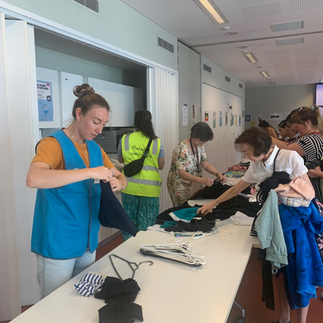Seamless Solutions: Australia's Pathway to Sustainable Fashion with Circular Practices
- Perspektiv
- Jun 21, 2023
- 3 min read
Updated: Jan 30
The fashion industry in Australia is grappling with a pressing environmental issue as a staggering 200,000 tonnes of clothing ends up in landfill every year. To combat this crisis, the Australian government, under the guidance of Environment Minister Tanya Plibersek, has put forth a voluntary landfill levy scheme known as 'Seamless.' This innovative initiative seeks to foster a circular economy within the fashion industry, with the aim of reducing waste and promoting sustainable practices among retailers and consumers alike.
In Australia today, more than 1.4 billion new clothing items are imported annually, with approximately half of them ending up in landfill. Such wasteful practices contribute to an estimated carbon footprint of up to 13 million tonnes per year. Recognising the urgent need for change, the government seeks to mobilise the industry towards more sustainable practices.
Under the Seamless scheme, fashion companies will be invited to apply a four-cents per item levy on their products. The collected funds will be allocated to initiatives aimed at reducing the environmental impact of clothing waste. The scheme focuses on three main pillars: designing products that generate less waste, utilising recyclable materials, and promoting repair, remodelling, and re-manufacturing. It also emphasises the importance of consumer education and invests in systems for collecting and sorting textiles at the end of their life cycle.
The new initiative sets an ambitious target of diverting 60 percent of end-of-life clothing from landfills by 2027. However, despite the government's proposal, no fashion company has formally signed on to the agreement yet. The Australian Fashion Council hopes that the country's 30 largest clothing retailers, responsible for approximately 60 percent of garments sold, will join the scheme within the next 12 months. Their involvement is crucial in driving meaningful change throughout the industry.
Leila Naja Hibri, the CEO of the Australian Fashion Council, highlights the need to move beyond recycling and upcycling programs, which are often expensive and insufficient to address the root causes of waste production. Instead, the Seamless scheme aims to encourage a transition to a circular fashion industry, where clothes are acquired differently, cherished for longer periods, and recirculated with care. This shift would involve changing consumption patterns and fostering a culture of sustainability.
Clothing circularity by 2030
Source: Roadmap-to-Clothing-Circularity, Australian Fashion Council.
In the pursuit of a more sustainable fashion industry, every individual effort counts. Sustainability Consultant Kirsten Neil demonstrates the power of personal involvement through her inspiring use of Perspektiv’s volunteering leave. Kirsten dedicated her time to support the Western Metropolitan Regional Council (WMRC) kids clothing swap, where she played a vital role in ensuring the event's success.
At the clothing swap, Kirsten assisted in weighing the donated clothes, allowing attendees to witness the impact of their contributions firsthand. Out of the 73.26 kg of clothing brought to the event, 27.86 kg (38%) were immediately reused by attendees, saving them from ending up in landfills. The remaining 45.4 kg (62%) of high-quality clothes were donated to Paraquad Industries, further extending their lifespan and reducing waste.
Kirsten's involvement highlights the importance of community-driven initiatives like the WMRC clothing swaps. By actively participating in such events, or by hosting clothing swaps yourself (with friends or a specific community group), individuals can contribute to the circular economy, promote sustainability, and prevent usable clothing from becoming waste.
The collaboration of government, fashion retailers, citizens, and passionate individuals like Kirsten is essential to achieving a future where clothes are acquired differently. Over the past year, Perspektiv has been providing support to clients in the fashion and textiles industry with third-party validation of their life cycle claims. By partnering with Perspektiv, your organisation can gain a comprehensive understanding of the cradle-to-grave impacts of your product's life cycle, encompassing factors such as carbon emissions and land use.
Together, we can shape a future where the fashion industry operates harmoniously with the principles of circularity, mitigating its impact on the planet and paving the way for a more sustainable tomorrow.











Comments